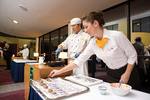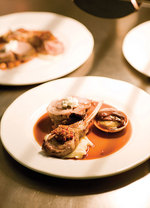New lamb has export flavour
 Animal Science Animal Science
Feeding lambs a diet rich in olive oil and garlic can provide additional flavours and other benefits that could assist in increasing lamb meat exports, new research at the University of Adelaide has found. The findings are the result of a three-year project called "Value-adding South Australian Lamb", funded through the Premier's Science and Research Fund. Led by University of Adelaide researcher Dr Zbigniew ("Zibby") Kruk from the School of Agriculture, Food and Wine, the project aimed to develop Australian lamb products that could become recognised as being unique and of superior quality. The research - based at the Roseworthy Campus - has built on the University's expertise in using diet to obtain optimum results from livestock, and in flavour and sensory testing. "Despite growing consumer demand for and awareness of lamb, the market overseas - such as Korea and Japan - has not yet reached its full potential. This is partly because the characteristic flavour of lamb is not fully appreciated by many consumers, especially those in overseas markets, and also because lamb has a distinctive 'sheep odour'," Dr Kruk said. "We're hoping that the results of our project will open the possibility of targeting new markets, giving consumers a new appreciation for lamb." The research looked at a range of natural diets that could be fed to lambs to produce differences in flavour, meat colour and odour. Of all the diets tested in the first two years, the clear winners were olive oil and garlic, which produced many positive results, such as reduced sheep odour, higher proportion of unsaturated fat, and reduced melting point of fat in the meat. One of the unexpected benefits of the project was the discovery that lambs fed on garlic grew almost twice as fast as those on regular diets, with obvious potential efficiencies for meat production. "While garlic and olive oil affected many different traits of the lamb meat separately, more research is now needed to investigate the use of these ingredients in combination," Dr Kruk said. The results of the three-year project were recently put to the test at a special dinner held by the project's research partners: the University of Adelaide, the South Australian Government, TAFE SA and industry partner Feast! Fine Foods. Held at Graduates Restaurant, TAFE SA Regency Campus, the dinner brought together members of government, business and academia to taste and score the new lamb varieties on offer. Among those trying the new lamb was South Australia's Agriculture, Food and Fisheries Minister, the Hon. Rory McEwen. "Value-adding South Australian Lamb is an exciting project for the State's food industry, with great potential to generate increased demand for lamb domestically and in growing export markets," Mr McEwen said. "With the globalisation of food markets and more discerning consumers, it's important for South Australian producers to find a competitive edge. We can do that through improved quality of meat, which can only come through the kind of innovation and collaborative effort this project has demonstrated," he said. Story by David Ellis
|







